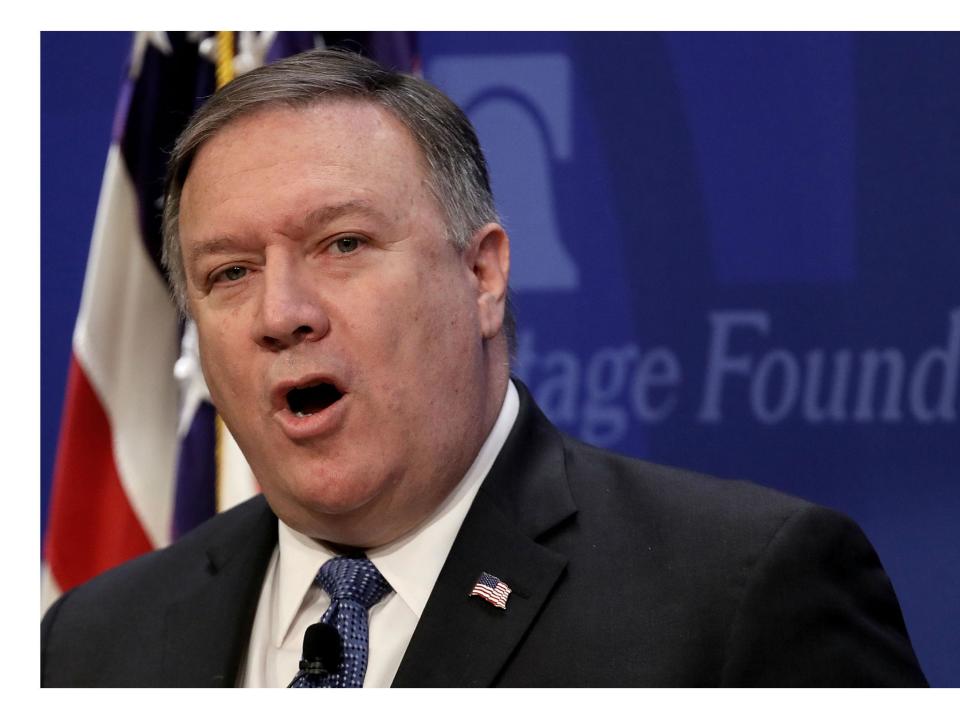Mike Pompeo threatens Iran with ‘strongest sanctions in history’

US Secretary of State Mike Pompeo has threatened Iran with “the strongest sanctions in history” and vowed to use all economic and military pressure to "crush" Tehran's operatives and proxies around the world.
The threat comes just after President Donald Trump announced that he would withdraw the United States from the Iran nuclear agreement, which he deemed flawed because it did not keep Iran from testing ballistic missiles and would eventually expire.
Mr Trump also argued that Iran was not in compliance with the basic goal of the deal — to restrict Iran from enriching weapons grade uranium — even though the US State Department and the UN's International Atomic Energy Agency (IAEA) had both confirmed compliance repeatedly. The deal was not intended to address ballistic missile development.
Following that announcement earlier this month, Mr Pompeo has demanded major changes from Iran, and has vowed that the country will not develop a nuclear weapon: “Not now, not ever”.
Mr Pompeo announced a list of 12 requirements that Iran muct meet before any further included many that Iran is highly unlikely to consider. He said Iran must allow nuclear inspectors "unqualified access to all sites throughout the country," Pompeo said, alluding to military sites that were off-limits under the 2015 deal except under specific circumstances. To that end, he also said Iran must declare all previous efforts to build a nuclear weapon, reopening an issue that the IAEA has already deemed a closed matter.
Video:
For more news videos visit Yahoo View.
During his speech at the conservative Heritage Foundation think tank in Washington, Mr Pompeo also latched onto one of Mr Trump's main concerns with supporting the nuclear deal - that it did little to curb what the US has called Iran's "destabilising" actions in the region and beyond.
A number of the demands require that Iran cease from a range of activities throughout the Middle East that have long drawn the ire of the US and its allies. He said Iran must end support for Shia Houthi rebels in Yemen, "withdraw all forces" from Syria, halt support for its ally Hezbollah and stop threatening Israel.
Other requirements are that Iran stops developing ballistic missiles, that it releases Americans held in detention in the country, and that it stop supporting groups in the Middle East considered to be terrorist organisations by the United States.
“Is this what you want your country to be known for?” Mr Pompeo asked, referring to Iran’s support of Hezbollah, which the US considered a foreign terrorist organisation. “The United States believe you deserve better.”
In his first major policy address Mr Pompeo said he will work with the US Defense Department and regional allies — a group that includes Israel, Saudi Arabia and the Gulf states — to “deter Iranian aggression in the region" including at sea and in cyberspace.
“This is just the beginning,” Mr Pompeo said on Monday of the sanctions that are set to go back into effect now that the US is withdrawing from the deal, which was also brokered by the UK, France, China, Russia and Germany.. “The sting of sanctions will be painful. These will be the strongest sanctions in history when complete.”
“After our sanctions come into full force, it will be battling to keep its economy alive,” Mr Pompeo said. “Iran will be forced to make a choice: either fight to keep its economy off life support at home or keep squandering precious wealth on fights abroad. It will not have the resources to do both.”
Mr Pompeo's threat was made through the prism of possible positive outcomes for Iranians, as he offered a possible way out for Iran. Tehran would be granted a series of dramatic potential US concessions if it agrees to make “major changes.” Under a new agreement, Washington would be willing to lift all sanctions, restore full diplomatic and commercial ties with Iran, and even support the modernization of its economy, Mr Pompeo said.
“Unlike the previous administration, we are looking for outcomes that benefit the Iranian people, not just the regime,” he added.
Mr Trump’s decision to pull the US out of the deal comes as his administration conducts negotiations with North Korea in an attempt to dismantle its nuclear program. Mr Pompeo has said that those talks — which have been in doubt somewhat recently — could serve as a template for future Iranian negotiations.
Other signatories on the Iran deal in Europe have signalled that they will remain committed to the deal in the wake of the American's decision, though it remains unclear how European businesses that have made deals in Iran might navigate reimposed US sanctions on the country.

